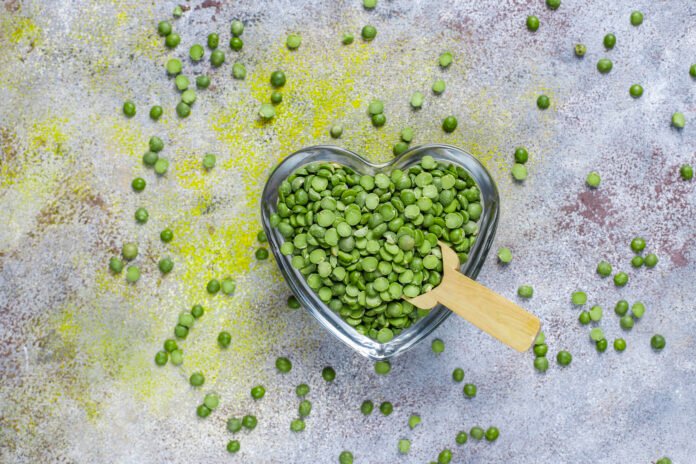Adding protein powders into your routine diet has become a popular way to increase your protein intake nowadays. A vast range of protein powders varieties are easily available that can help you uptake your protein level. But the question is, why do you need to increase your protein level? Protein is made up of amino acids which are the building blocks of your body’s tissues, cells and organs. So the reason is clear. You need more protein to build your body and muscles especially. Protein powders are an effective source to increase your strength and endurance, especially if you are engaged in strength training workouts. Pea Protein is one of the most effective plant based protein powders that can help you increase your protein uptake without causing any side effect. People are still confused about what is better for increasing protein uptake the most popular whey protein or the newly introduced pea protein. Lets have a talk to find which is best!
Now, the point of discussion is, how would you know what type of protein powder is good for you. Protein powders are actually used as supplements. They can be made from both plant and animal sources. As protein powders are found in abundance in the market, you may feel overwhelmed with choices. Whey protein is an animal based protein which is extracted from cow’s milk. But the increasing popularity of plant based protein powder is the prominent sign that can drag you towards them. The most popular plant based protein powder is pea plant these days. So, here you will find a detailed explanation about the nutritional profile of the opera plant so that you may understand the similarities and differences between pear protein and whey protein. This complete information will help you choose the best. After reading the article you may determine which one will be best for you, pea protein or whey protein.
How Do You Compare Pea Protein with Whey Protein?
Protein powders are the protein extractions of whole foods. The extracted protein is concentrated and then converted into a powdered form.
Research showed that a variety of techniques are used to prepare a specific type of supplement in the form of isolated desired protein. Manufacturers often add acids and enzymes to prepare concentrated powders of protein. Sometimes they also use filtering procedures to get the most pure protein powder.
Thus the main difference between pea protein and whey protein is the source from where the protein is extracted.
Pea protein is extracted from plants that’s why it is lactose-free. Yellow split-peas and legumes are chosen to isolate the protein while whey protein is extracted from milk. It is a left-over residue of cheese making process. It contains milk sugar lactose because it is extracted from milk.
More noticeable differences between pea protein and whey protein are:
| Type | Source | Processing | Flavor | Texture | Lactose Present or Not | Gluten Present or Not | Uses | |
| Pea Protein | Plant based | Made from peas | Mechanical separation | Raw and earthy | Creamy and smooth texture | No | No | Added in drinks and foods |
| Whey Protein | Animal based | Made from milk | Chemical separation | Milky | Thin milk-like texture | A little amount of lactose | A little quantity of added gluten | Add into drinks and food |
Allergens
Many types of whey protein contain several types of allergens like gluten and ;lactose while most types of pea protein are free from such allergens.
This feature makes pea protein and other plant-based protein powders more suitable and effective for use. Because protein powders free from gluten and lac cruise are desirable chives for the people who have allergies like lactose intolerance or gluten intolerance. People who can’t eat dairy products usually prefer plant-based protein powders like pea protein. As gluten-free or lactose-free protein powders are essential to digest and they don’t cause allergies or intolerance. You may prefer pea protein to wheat protein because it also makes you less bloated and does not create gas trouble.
Similarities between Pea Protein and Whey Protein
Although the above mentioned heading has convinced you much about the differences between pea protein and whey protein. But there are still some similarities among them. They are not completely different. They share some properties to a great extent.
For example, if you’re a beginner, both the pea protein and whey protein are the best options for you. In addition, both types of protein powders are easy to mix with other drinks and foods and incredibly versatile in taste and texture. You can use them simply by mixing them into a shake or simple mi;k. They can also be added to many types of foods and drinks like muffins, smoothies, oatmeal, and pancakes.
Nutritional Profile
If you look keenly at the details of the nutrition profile of both protein powders, you can better understand what type is best for you. So the 50 gram of pea protein and whey protein powder contain:
| Pea Protein | Whey Protein | |
| Protein | 25 grams | 28 grams |
| Sugar | Nill | Nill |
| Calories | 122 | 120 |
| Carbs | 2.5 grams | 2 grams. |
| Fiber | 2 grams | Nill |
| Cholesterol | Nill | 0.01 grams |
| Fat | 1.5 grams | 0.05 grams |
| Iron | 45% of DV | Nill |
| Potassium | 1.5 % of DV | 5% of DV |
| Calcium | 7% of DV | 9% of DV |
| Sodium | 10% of DV | 1% of DV |
As the table shows, both types of protein powders have great content of protein. A keen observation may help you observe that whey protein powder has a little more amount of protein than the pea protein powder. One more thing both have lower levels of sugar, fat, carbs and fiber.
In addition, whey protein is extracted from milk or milk products, it has a greater quantity of potassium and calcium whereas being a plant-based protein, pea protein is rich in iron that is a great requirement for your body.
Moreover, many studies supported the information that both protein powders have the beneficial components that make them the best choice for the people who want to increase their protein intake for different purposes. But one feature that makes pea protein powder more effective is the presence of antioxidants that help you fight disease. However there are no authentic proofs to verify how many beneficial compounds still remain in pressed protein powders and how they affect the overall health of human beings.
Protein Content
The nutritional profile comparison has made it clear that prepared protein and whey protein contain similar amounts of protein content but still whey protein tends to have some more grams of protein content per serving than pea protein somehow.
Researchers disclosed that different brands add different quantities of protein content in protein powders. Protein content also depends on the serving size and scoop size of brands. Each protein powder packaging contains this information on the label. This is because you should read this information and select the one which has protein content according to your needs.
So it is clear that whey and pea protein both have large quantities of protein content but they may differ in types of protein they contain. According to general research, people normally digest the animal baked protein more easily than plant-based protein because animal-based proteins get absorbed in your body during muscle-building exercises. However, studies also conclude that it depends on the presence of the type of amino acids in the protein powder that determines how quickly the body will absorb and use the protein.
Role of Amino Acids
Amino acids are not only the manufacturing unit of protein but also the building block of your body. Some of them are essential and others are known as non-essential amino acids. The nine essential amino acids cannot be produced by the body on its own. This means you have to get them through your diet. When it comes to the presence of all nine essential amino acids Whey protein powder is at the top of all protein powders. Because all nine essential amino acids are found in whey protein. Highly essential branched-chain amino acids like valine, leucine and isoleucine make whey protein highly recommended protein powder.
On the other hand, when we come on to the pea protein, it will be observed that pea protein is also rich in all essential amino acids. But it only has less amount if one essential amino acid known as methionine. Therefore, sometimes expats do not enlist pea protein as a complete protein.
But whenever, a comparison has been made among all types of plant-based protein powders, pea protein comes at the top of the list because it is the one and only plant-based protein that contains all essential amino acids. Some studies show that pea protein contains phenylalanine and histidine. If you are still worried about missing any essential amino acid while using pea protein, you may mix pea protein with any other type of plant-based protein that has maximum numbers of essential amino acids.
Popular Uses of Protein Powders
Protein powders have many useful aspects. Most of the popular advantages of protein powders are building strength, maintaining muscle storage, and tissue repair. However, you may also use it to increase protein intake, weight loss and as cereal replacements.
Use in Muscle Gain
If you’re taking a diet lacking in protein, you may experience loss in muscle strength. Taking protein powder for muscle gain is a common use of protein powder. However, if your diet is sufficient in protein content, you may not need extra protein supplements.
Now the point of focus is to choose the best type of protein powder according to your needs. It in fact depends on your needs. If you want to build your muscles, you should prefer whey protein to pea protein because it contains all nine essential amino acids that can support your muscle building process. But many studies have found that pea protein has the same effects on your muscle building as the whey protein. Both have the same effect on your muscle thickness and both are recommended for muscle recovery after resistance training workouts.
Fueling on the Go
You can use protein powders for fueling yourself on the go. They are easiest to carry anywhere. Mixing them into a shake, smoothie or other drink is the most easy way to boost your nutrition anytime anywhere.
In addition, Protein powders also provide you with the best and easiest recipe for breakfast. Make a tasteful and energetic smoothie with oats, carbs and protein powder to have a balance and nutritious breakfast at the start of the day. People usually prefer to add protein powder in almond butter or banana smoothie.
Benefits for Weight Loss
According to studies, pea proteins and whey protein affect your appetite in the same way.they have equal impacts on your food intake. But some noticeable differences between animal and plant-based protein have also been studied. Even studies also suggest that whey protein doesn’t affect the weight loss procedure to a great extent. However, some studies suggested that pea protein can affect your weight loss in a better way than whey protein. Pea protein controls your appetite and increases the feelings of fullness. These factors have a great influence on weight loss.
But modern research does not support those findings and suggests that pea protein supplements are not useful for weight loss as it can’t affect your appetite. Higher fiber content present in pea protein may be the reason for making you feel fuller for longer. However, these findings are not enough to prove the effectiveness of pea protein or whey protein for weight loss.
Conclusion
There is not enough research based proof that can help you determine which type of protein powder is best for you, pea protein or whey protein. But making a comparison between the nutritional profiles of both types of protein, you can consider one of them for your weight loss and muscle building purposes. One thing that makes a difference between the both is the protein and amino acid content. The whey protein has all nine essential amino acids that make it the perfect choice for those who want to add protein powder into their daily diet for building muscle or muscle gain.
On the other hand, people who like to eat vegan diets, mostly choose pea protein, because it is a plant-based protein. Although all these factors affect the importance of protein powder in your life, the main factor is the deficiency of protein in your body. People who lack protein content, need to add protein powder supplements to their diet. Studies show that each type has its own positive and beneficial effects. So you can try any of these after consulting your nutritionist.







